stop start MITSUBISHI iMiEV 2014 1.G Owners Manual
[x] Cancel search | Manufacturer: MITSUBISHI, Model Year: 2014, Model line: iMiEV, Model: MITSUBISHI iMiEV 2014 1.GPages: 262, PDF Size: 26.84 MB
Page 10 of 262
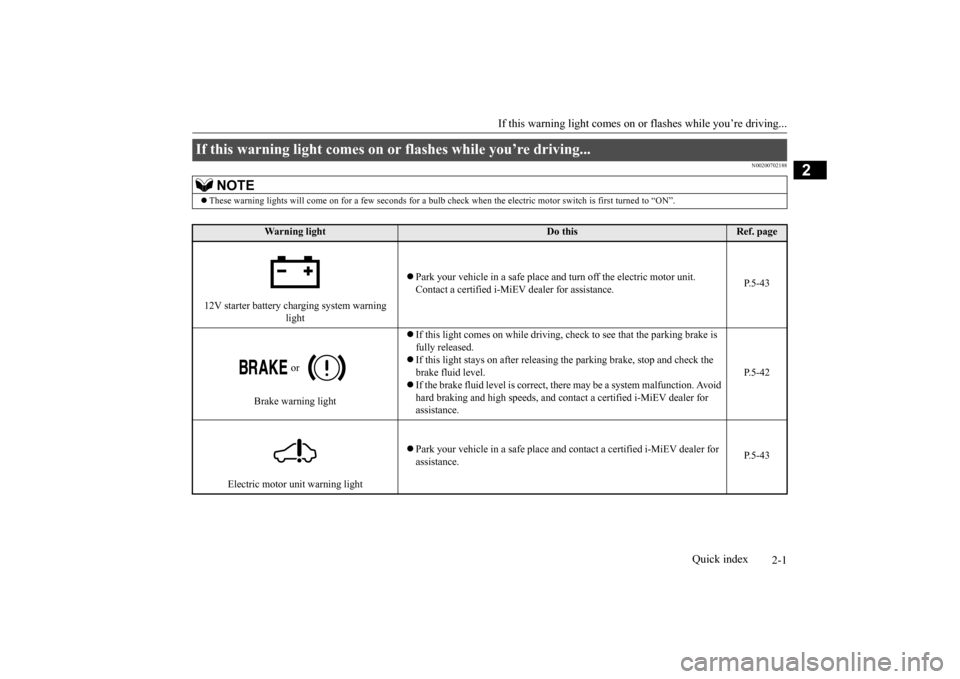
2-1
2
If this warning light comes on or
flashes while you’re driving...
Quick index
N00200702188
If this warning light comes on
or flashes while you’re driving...
NOTE
These warning lights will come on for a few se
conds for a bulb check when the electric
motor switch is first turned to “ON”.
Warning light
Do this
Ref. page
12V starter battery charging system warning
light
Park your vehicle in a safe place a
nd turn off the electric motor unit.
Contact a certified i-MiEV dealer for assistance.
P.5-43
or
Brake warning light
If this light comes on while driving, ch
eck to see that the parking brake is
fully released. If this light stays on after releasing
the parking brake, stop and check the
brake fluid level. If the brake fluid level is correct, ther
e may be a system
malfunction. Avoid
hard braking and high speeds, and cont
act a certified i-MiEV dealer for
assistance.
P.5-42
Electric motor unit warning light
Park your vehicle in a safe place and
contact a certified
i-MiEV dealer for
assistance.
P.5-43
BK0209800US.book 1 ページ 2014年1月14日 火曜日 午前9時26分
Page 11 of 262
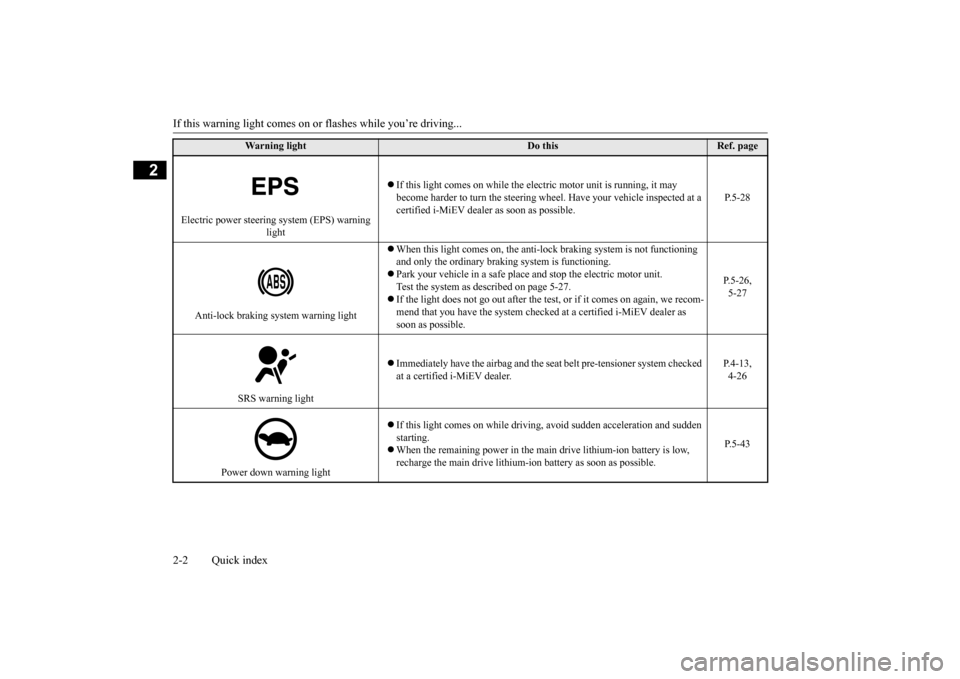
If this warning light comes on or flashes while you’re driving... 2-2 Quick index
2
Electric power steering
system (EPS) warning
light
If this light comes on while the elec
tric motor unit is running, it may
become harder to turn the steering wh
eel. Have your vehicle inspected at a
certified i-MiEV
dealer as soon as possible.
P. 5 - 2 8
Anti-lock braking system warning light
When this light comes on, the anti-l
ock braking system is not functioning
and only the ordinary brak
ing system is functioning.
Park your vehicle in a safe plac
e and stop the electric motor unit.
Test the system as described on page 5-27. If the light does not go out
after the test, or if it comes on again, we recom-
mend that you have the system checked
at a certified i-MiEV dealer as
soon as possible.
P.5-26, 5-27
SRS warning light
Immediately have the airb
ag and the seat belt pre-
tensioner system checked
at a certified i-MiEV dealer.
P.4-13, 4-26
Power down warning light
If this light comes on while driving,
avoid sudden acce
leration and sudden
starting. When the remaining power in the main drive lithium-ion battery is low, recharge the main drive lithium-ion battery as soon as possible.
P. 5 - 4 3
Warning light
Do this
Ref. page
BK0209800US.book 2 ページ 2014年1月14日 火曜日 午前9時26分
Page 12 of 262
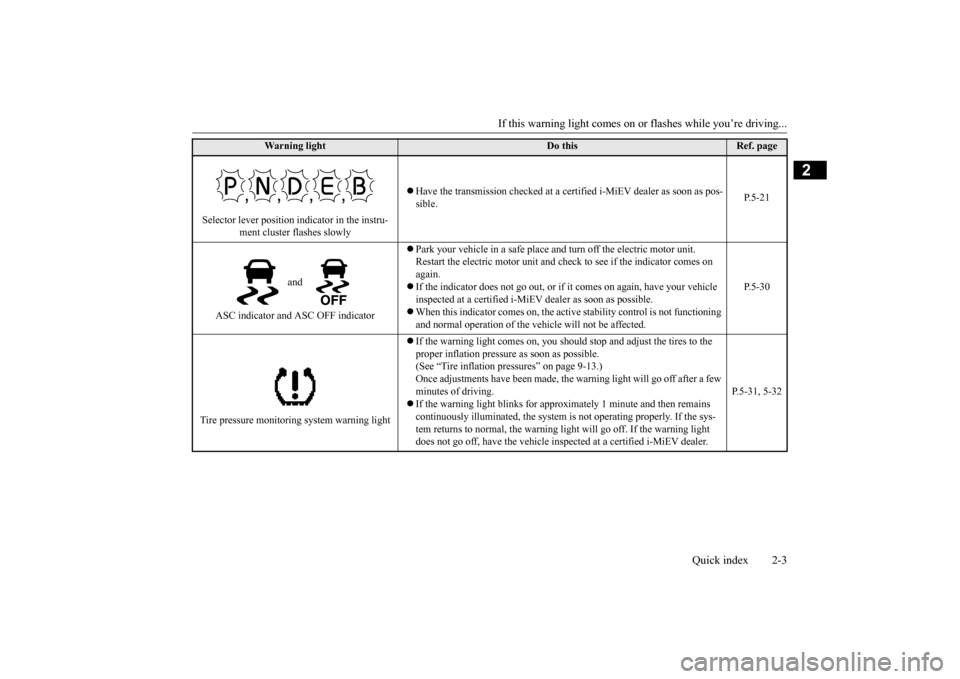
If this warning light comes on or
flashes while you’re driving...
Quick index 2-3
2
Selector lever position indicator in the instru-
ment cluster flashes slowly
Have the transmission checked at a cert
ified i-MiEV dealer as soon as pos-
sible.
P.5-21
and
ASC indicator and ASC OFF indicator
Park your vehicle in a safe place a
nd turn off the electric motor unit.
Restart the electric motor unit and check to see if the indicator comes on again. If the indicator does not go out, or if it
comes on again, have your vehicle
inspected at a certified i-MiEV
dealer as soon as possible.
When this indicator comes on, the acti
ve stability contro
l is not functioning
and normal operation of the vehi
cle will not be affected.
P.5-30
Tire pressure monitoring system warning light
If the warning light comes on, you shoul
d stop and adjust the tires to the
proper inflation pressure
as soon as possible.
(See “Tire inflation pr
essures” on page 9-13.)
Once adjustments have been made, the
warning light will go off after a few
minutes of driving. If the warning light blinks for appr
oximately 1 minute and then remains
continuously illuminated, the system is
not operating properly. If the sys-
tem returns to normal, the warning li
ght will go off. If the warning light
does not go off, have the vehicle insp
ected at a certified i-MiEV dealer.
P.5-31, 5-32
Warning light
Do this
Ref. page
BK0209800US.book 3 ページ 2014年1月14日 火曜日 午前9時26分
Page 23 of 262
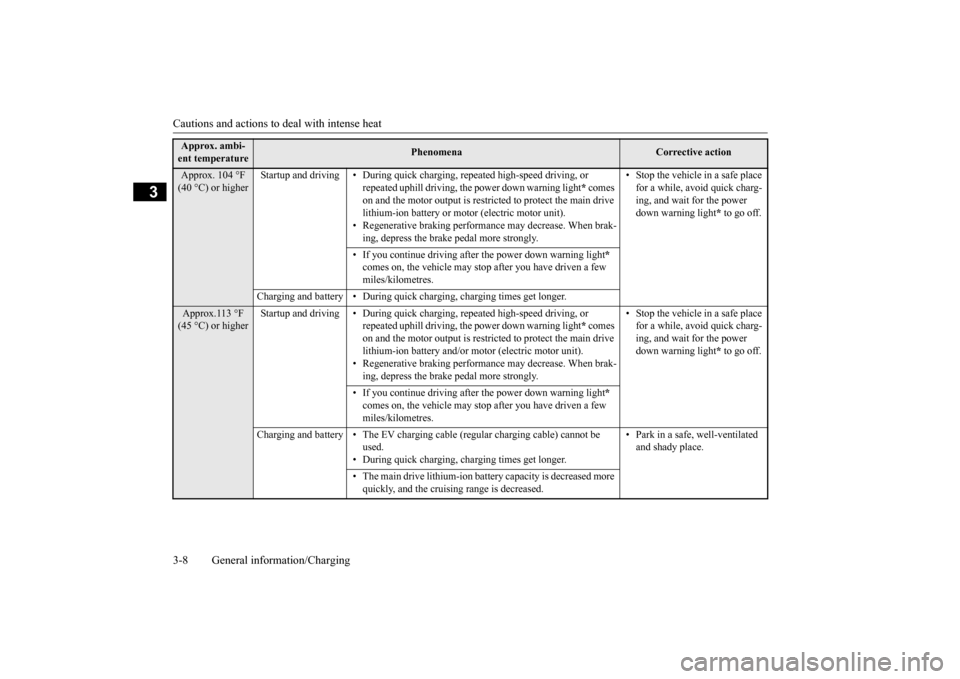
Cautions and actions to deal with intense heat 3-8 General information/Charging
3
Approx. ambi- ent temperature
Phenomena
Corrective action
Approx. 104 °F (40 °C) or higher
Startup and driving •
• During quick charging, repeated high-speed driving, or repeated uphill driving,
the power down warning light
* comes
on and the motor output is restrict
ed to protect the main drive
lithium-ion battery or mo
tor (electric motor unit).
Regenerative braking performance
may decrease. When brak-
ing, depress the brake pedal more strongly.
• Stop the vehicle in a safe place for a while, avoid quick charg- ing, and wait for the power down warning light
* to go off.
• If you continue driving after the power down warning light
*
comes on, the vehicle may stop
after you have driven a few
miles/kilometres.
Charging and battery • During quick
charging, charging times get longer.
Approx.113 °F (45 °C) or higher
Startup and driving •
• During quick charging, repeated high-speed driving, or repeated uphill driving,
the power down warning light
* comes
on and the motor output is restrict
ed to protect the main drive
lithium-ion battery and/or motor (electric motor unit). Regenerative braking performance
may decrease. When brak-
ing, depress the brake pedal more strongly.
• Stop the vehicle in a safe place for a while, avoid quick charg-ing, and wait for the power down warning light
* to go off.
• If you continue driving after the power down warning light
*
comes on, the vehicle may stop
after you have driven a few
miles/kilometres.
Charging and battery •
• The EV charging cable (regular charging cable) cannot be used. During quick charging, ch
arging times get longer.
• Park in a safe, well-ventilated and shady place.
• The main drive lithium-ion batt
ery capacity is decreased more
quickly, and the cruisi
ng range is decreased.
BK0209800US.book 8 ページ 2014年1月14日 火曜日 午前9時26分
Page 24 of 262
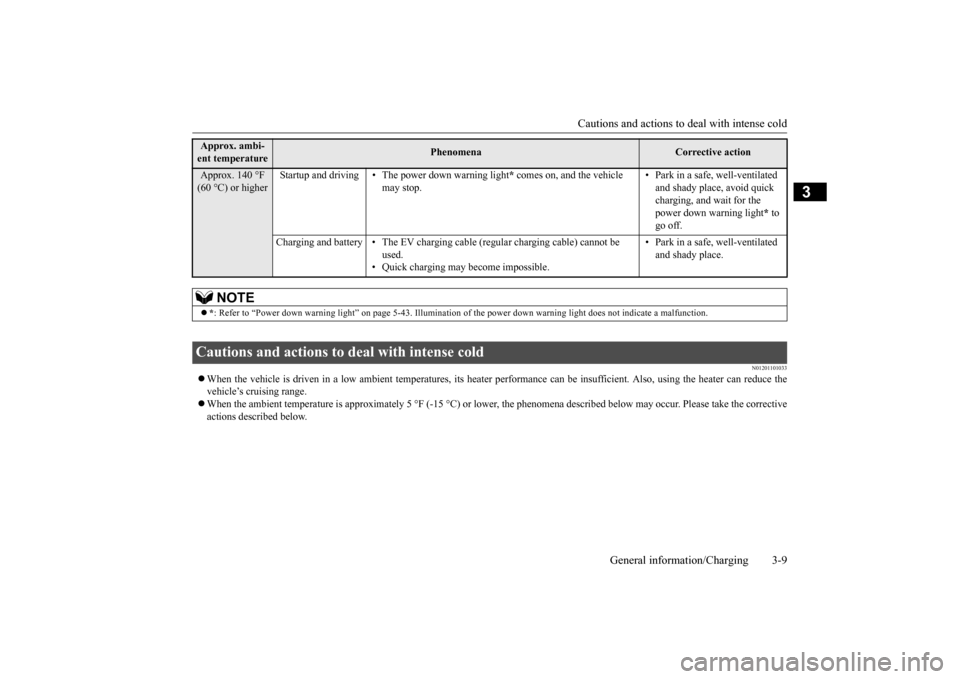
Cautions and actions to deal with intense cold
General information/Charging 3-9
3
N01201101033
When the vehicle is driven in a low ambient temperatures, its he
ater performance can be insuffic
ient. Also, using the heater ca
n reduce the
vehicle’s cruising range. When the ambient temperature is approximate
ly 5 °F (-15 °C) or lower, the phenomena de
scribed below may occu
r. Please take the
corrective
actions described below.Approx. 140 °F (60 °C) or higher
Startup and driving • The power down warning light
* comes on, and the vehicle
may stop.
• Park in a safe, well-ventilated and shady place,
avoid quick
charging, and wait for the power down warning light
* to
go off.
Charging and battery •
• The EV charging cable (regular
charging cable) cannot be
used.Quick charging may become impossible.
• Park in a safe, well-ventilated and shady place.
NOTE
*: Refer to “Power down warning light” on pa
ge 5-43. Illumination of the power down wa
rning light does not i
ndicate a malfunctio
n.
Cautions and actions to deal with intense cold Approx. ambi- ent temperature
Phenomena
Corrective action
BK0209800US.book 9 ページ 2014年1月14日 火曜日 午前9時26分
Page 25 of 262
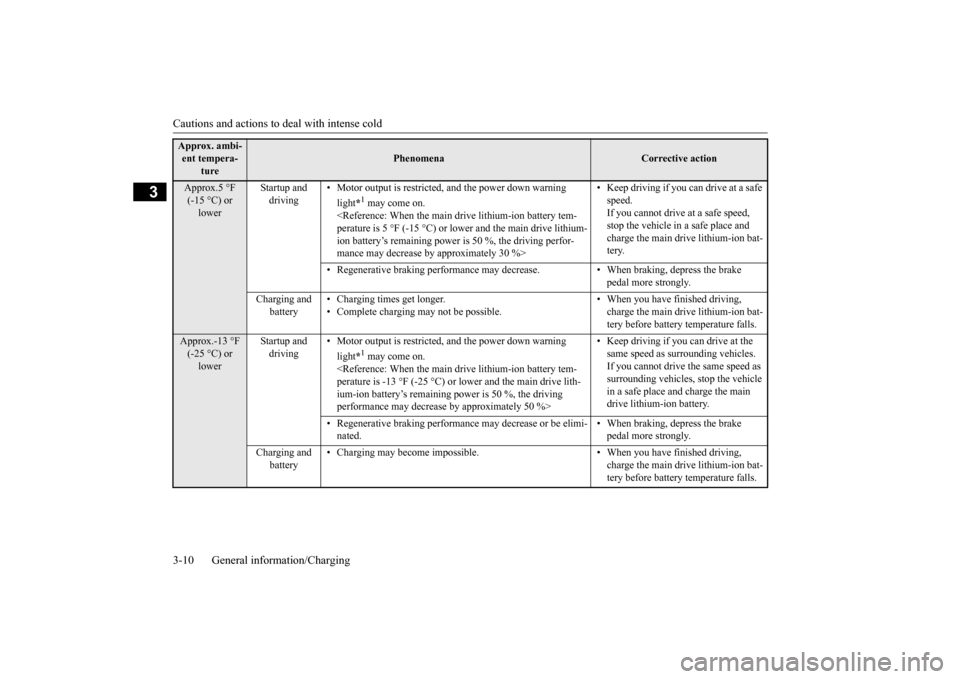
Cautions and actions to deal with intense cold 3-10 General information/Charging
3
Approx. ambi- ent tempera-
ture
Phenomena
Corrective action
Approx.5 °F (-15 °C) or lower
Startup and driving
• Motor output is restricted
, and the power down warning
light
*1 may come on.
• Keep driving if you can drive at a safe speed. If you cannot drive at
a safe speed,
stop the vehicle in a safe place and charge the main drive lithium-ion bat- tery.
• Regenerative braking performance may decr
ease. • When braking, depress the brake
pedal more strongly.
Charging and
battery
• • Charging times get longer. Complete charging may not be possible.
• When you have finished driving, charge the main drive lithium-ion bat- tery before battery temperature falls.
Approx.-13 °F (-25 °C) or lower
Startup and driving
• Motor output is restricted
, and the power down warning
light
*1 may come on.
• Keep driving if you can drive at the same speed as su
rrounding vehicles.
If you cannot drive th
e same speed as
surrounding vehicles, stop the vehicle in a safe place and charge the main drive lithium-ion battery.
• Regenerative braking performance
may decrease or be elimi-
nated.
• When braking, depress the brake pedal more strongly.
Charging and
battery
• Charging may become impossible. • W
hen you have finished driving, charge the main drive lithium-ion bat- tery before battery temperature falls.
BK0209800US.book 10 ページ 2014年1月14日 火曜日 午前9時26分
Page 34 of 262
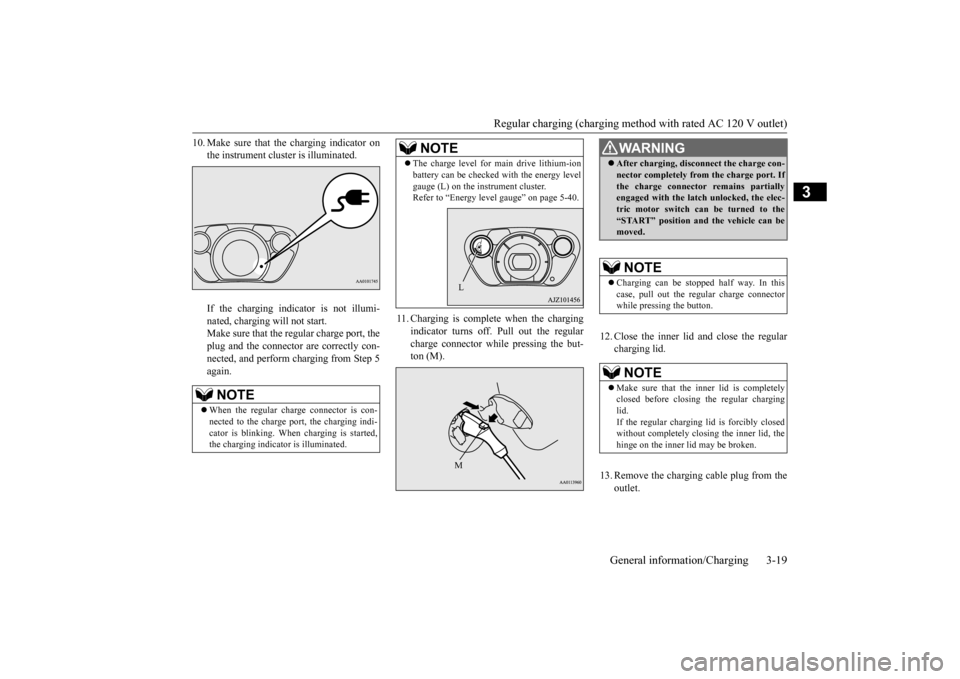
Regular charging (charging method with rated AC 120 V outlet)
General information/Charging 3-19
3
10. Make sure that the charging indicator on
the instrument cluster is illuminated. If the charging indicator is not illumi- nated, charging will not start. Make sure that the regular charge port, theplug and the connector are correctly con- nected, and perform charging from Step 5 again.
11. Charging is complete when the charging
indicator turns off. Pull out the regular charge connector while pressing the but- ton (M).
12. Close the inner lid and close the regular
charging lid.
13. Remove the charging cable plug from the
outlet.
NOTE
When the regular char
ge connector is con-
nected to the charge port, the charging indi-cator is blinking. When
charging is started,
the charging indicator is illuminated.
The charge level for main drive lithium-ion battery can be checked
with the energy level
gauge (L) on the instrument cluster.Refer to “Energy level gauge” on page 5-40.NOTE
LM
WA R N I N G After charging, discon
nect the charge con-
nector completely from the charge port. Ifthe charge connector remains partiallyengaged with the latch unlocked, the elec- tric motor switch can be turned to the “START” position an
d the vehicle can be
moved.NOTE
Charging can be stopped
half way. In this
case, pull out the regular charge connector while pressing the button.NOTE
Make sure that the inner lid is completely closed before closing the regular charging lid.If the regular charging
lid is forcibly closed
without completely clos
ing the inner lid, the
hinge on the inner
lid may be broken.
BK0209800US.book 19 ページ 2014年1月14日 火曜日 午前9時26分
Page 38 of 262
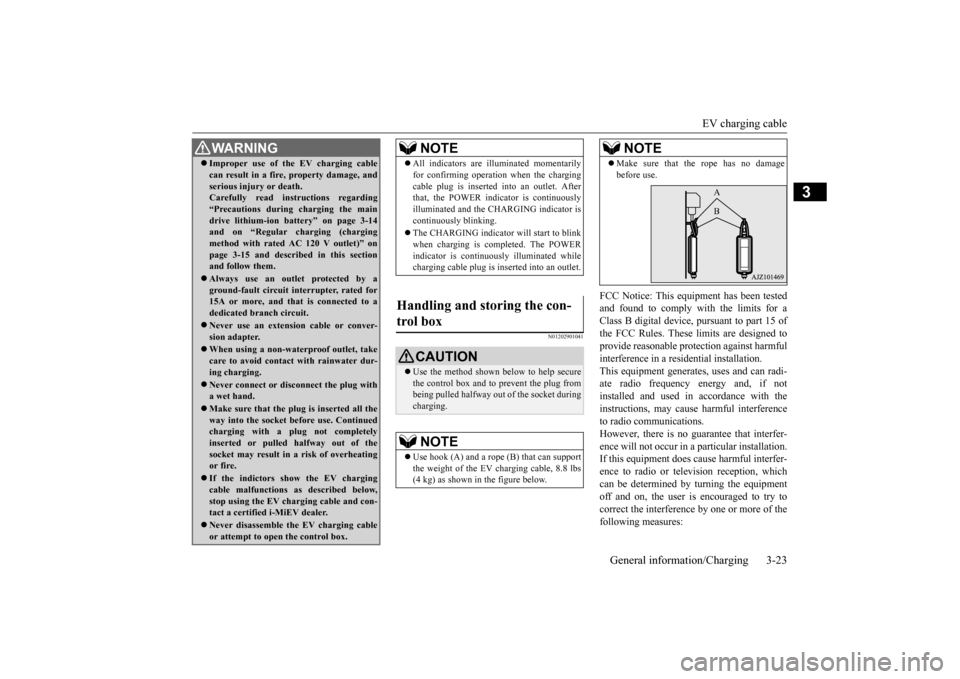
EV charging cable
General information/Charging 3-23
3
N01202901041
FCC Notice: This equi
pment has been tested
and found to comply with the limits for aClass B digital device,
pursuant to part 15 of
the FCC Rules. These limits are designed to provide reasonable prot
ection against harmful
interference in a residential installation. This equipment generates, uses and can radi- ate radio frequency energy and, if notinstalled and used in accordance with the instructions, may caus
e harmful interference
to radio communications.However, there is no guarantee that interfer- ence will not occur in a particular installation. If this equipment does
cause harmful interfer-
ence to radio or tele
vision reception, which
can be determined by turning the equipment off and on, the user is encouraged to try tocorrect the interference by
one or more of the
following measures:
WA R N I N G Improper use of the
EV charging cable
can result in a fire, property damage, andserious injury or death.Carefully read instructions regarding “Precautions during
charging the main
drive lithium-ion battery” on page 3-14and on “Regular charging (charging method with rated AC 120 V outlet)” on page 3-15 and describe
d in this section
and follow them. Always use an outlet protected by a ground-fault circuit interrupter, rated for 15A or more, and that
is connected to a
dedicated branch circuit. Never use an extension cable or conver- sion adapter. When using a non-wate
rproof outlet, take
care to avoid contact
with rainwater dur-
ing charging. Never connect or disconnect the plug with a wet hand. Make sure that the plug is inserted all the way into the socket before use. Continued charging with a plug not completely inserted or pulled
halfway out of the
socket may result in a risk of overheating or fire. If the indictors show the EV charging cable malfunctions as described below, stop using the EV charging cable and con-tact a certified i-MiEV dealer. Never disassemble the EV charging cable or attempt to open
the control box.
NOTE
All indicators are illuminated momentarily for confirming operation when the chargingcable plug is inserted into an outlet. Afterthat, the POWER indi
cator is continuously
illuminated and the CH
ARGING indicator is
continuously blinking. The CHARGING indicator will start to blink when charging is completed. The POWERindicator is continuous
ly illuminated while
charging cable plug is in
serted into an outlet.
Handling and storing the con- trol box
CAUTION Use the method shown below to help secure the control box and to prevent the plug from being pulled halfway out of the socket duringcharging.NOTE
Use hook (A) and a rope (B) that can support the weight of the EV charging cable, 8.8 lbs (4 kg) as shown in the figure below.
Make sure that the rope has no damage before use.NOTE
A B
BK0209800US.book 23 ページ 2014年1月14日 火曜日 午前9時26分
Page 42 of 262
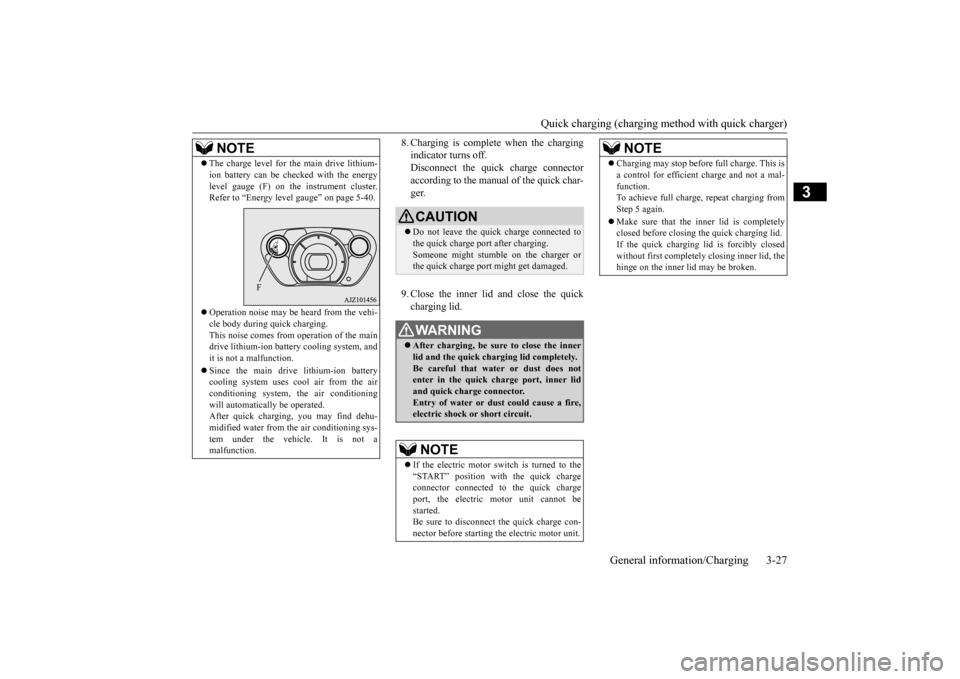
Quick charging (charging method with quick charger)
General information/Charging 3-27
3
8. Charging is complete when the charging indicator turns off.Disconnect the quick charge connector according to the manual of the quick char- ger. 9. Close the inner lid and close the quick charging lid.
The charge level for the main drive lithium- ion battery can be checked with the energylevel gauge (F) on the
instrument cluster.
Refer to “Energy leve
l gauge” on page 5-40.
Operation noise may be heard from the vehi- cle body during quick charging.This noise comes from operation of the main drive lithium-ion batter
y cooling system, and
it is not a malfunction. Since the main driv
e lithium-ion battery
cooling system uses cool air from the airconditioning system,
the air conditioning
will automatically be operated. After quick charging, you may find dehu-midified water from
the air conditioning sys-
tem under the vehicle. It is not a malfunction.NOTE
F
CAUTION Do not leave the quick charge connected to the quick charge port after charging. Someone might stumble on the charger orthe quick charge port might get damaged.WA R N I N G After charging, be sure to close the inner lid and the quick charging lid completely.Be careful that water or dust does not enter in the quick charge port, inner lid and quick charge connector.Entry of water or dust could cause a fire, electric shock or
short circuit.
NOTE
If the electric motor switch is turned to the “START” position with the quick charge connector connected to the quick chargeport, the electric motor unit cannot be started. Be sure to disconnect
the quick charge con-
nector before starting
the electric motor unit.
Charging may stop before full charge. This is a control for efficient charge and not a mal-function.To achieve full charge, repeat charging from Step 5 again. Make sure that the inner lid is completely closed before closing the quick charging lid. If the quick charging li
d is forcibly closed
without first co
mpletely closing inner lid, the
hinge on the inner
lid may be broken.
NOTE
BK0209800US.book 27 ページ 2014年1月14日 火曜日 午前9時26分
Page 43 of 262
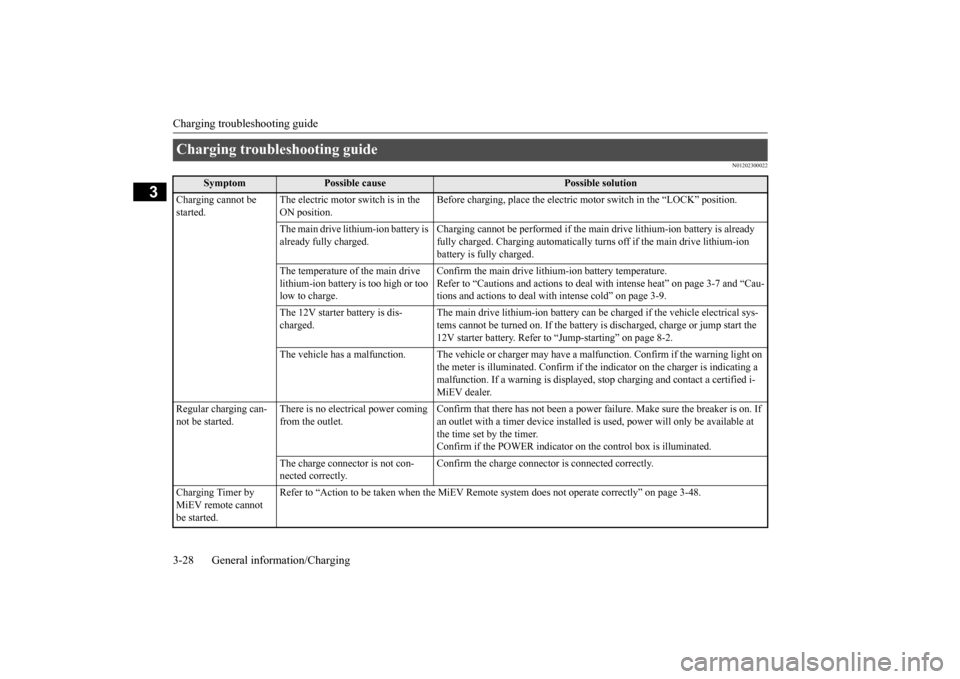
Charging troubleshooting guide 3-28 General information/Charging
3
N01202300022
Charging troubleshooting guide
Symptom
Possible cause
Possible solution
Charging cannot be started.
The electric motor switch is in the ON position.
Before charging, place the electric motor switch in the “LOCK” position.
The main drive lithium-ion battery is already fully charged.
Charging cannot be performed if the ma
in drive lithium-ion
battery is already
fully charged. Charging automatically turns off if the main drive lithium-ion battery is fully charged.
The temperature of the main drive lithium-ion battery
is too high or too
low to charge.
Confirm the main drive lithium-ion battery temperature. Refer to “Cautions and acti
ons to deal with intense heat” on page 3-7 and “Cau-
tions and actions to deal wi
th intense cold” on page 3-9.
The 12V starter battery is dis- charged.
The main drive lithium-ion battery can be charged if the vehicle electrical sys- tems cannot be turned on. If the battery is
discharged, charge or jump start the
12V starter battery. Refer to
“Jump-starting” on page 8-2.
The vehicle has a malf
unction. The vehicle or charger
may have a malfunction. Confir
m if the warning light on
the meter is illuminated. Confirm if the indicator on the charger is indicating a malfunction. If a warning is displayed,
stop charging and contact a certified i-
MiEV dealer.
Regular charging can- not be started.
There is no electrical power coming from the outlet.
Confirm that there has not been a power fa
ilure. Make sure the breaker is on. If
an outlet with a timer device installed
is used, power will onl
y be available at
the time set by the timer. Confirm if the POWER indicator on
the control box
is illuminated.
The charge connector is not con- nected correctly.
Confirm the charge connector
is connected correctly.
Charging Timer by MiEV remote cannot be started.
Refer to “Action to be taken when the MiEV Remote
system does not operate correctly” on page 3-48.
BK0209800US.book 28 ページ 2014年1月14日 火曜日 午前9時26分